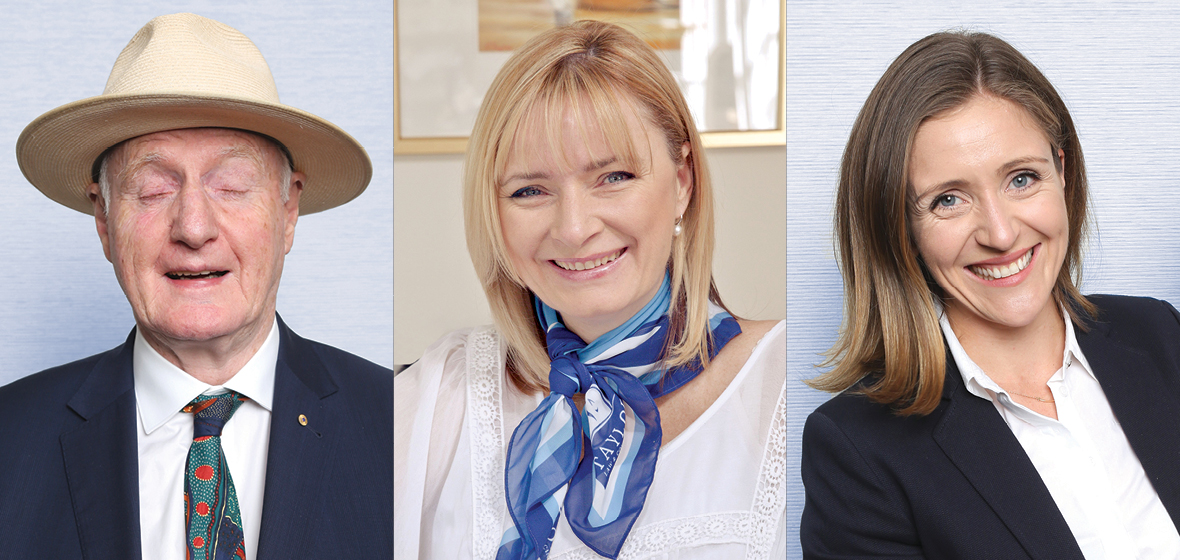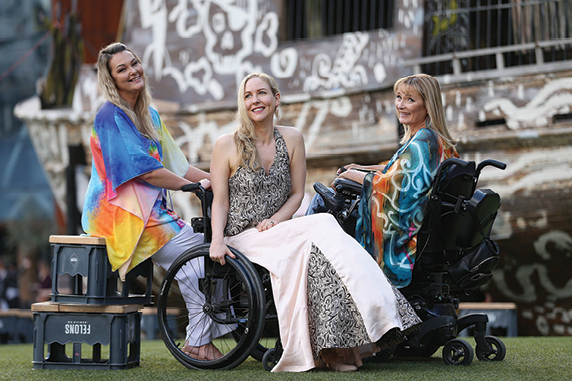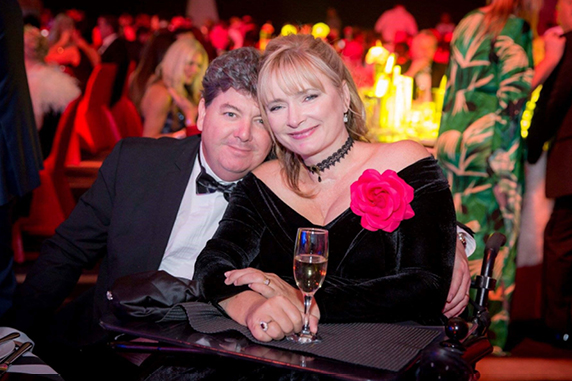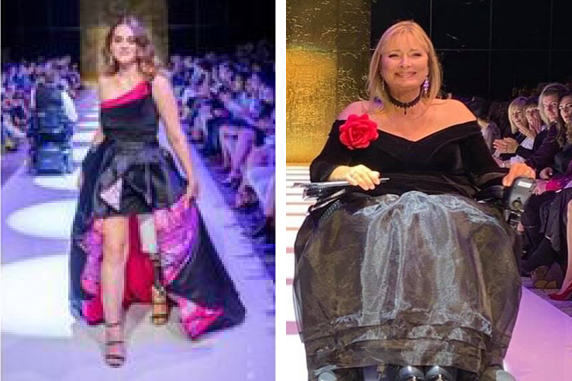No diversity without disability
On 3 December, the world celebrates International Day of People with Disability. While improvements in accessibility and awareness have made it possible for people of all backgrounds to reach the top of the legal profession, diversity will not be fully realised until greater space is made for lawyers with disabilities.
The Australian Human Rights Commission identified disability discrimination as the leading concern for complaints made in 2018/19, accounting for 44 per cent of claims lodged. The legal profession is in a prime position to lead by example.
In their own words, three successful and courageous lawyers share their stories of perseverance, determination and achieving their dreams against the odds.
Carol Taylor
Carol Taylor is the legal practice director and principal solicitor at Taylor Law and Conveyancing, and the world’s first quadriplegic designer who recently showcased her collection on the catwalk at the Brisbane Fashion Festival. Carol became a quadriplegic after a car accident in 2001. Since then, she has found a new love and talent for art, turned her passion for fashion into a design range attracting global acclaim, opened her own law practice, and achieved her greatest dream of becoming a mother.
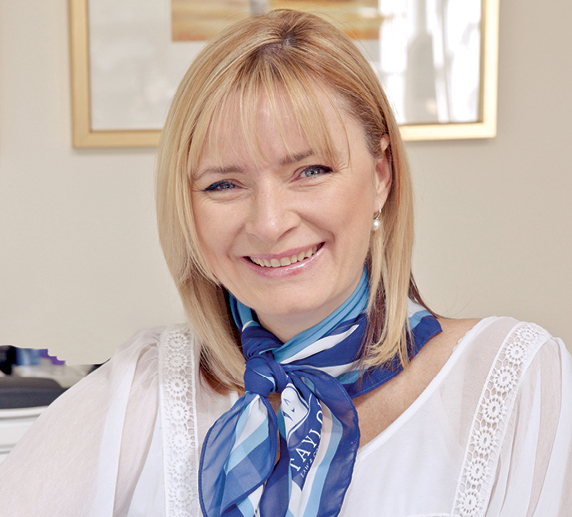
“I spent almost a year in hospital after the accident, and they were the darkest days. During that time, I asked my husband, Robert, for a divorce, thinking it’d be what he wanted. Shortly after, he took me down to the courtyard of the hospital café, and I heard the music from our wedding playing, with my parents, a priest and an alter. We renewed our wedding vows. I stand on the shoulders of Robert and our 13-year-old son, D’arcy. They are the scaffolding beneath me and I draw all my strength from them.
I never know what I am going to get in a day in a legal practice. There will be contracts to work through, calls to make and clients to see. At the moment, we are a tiny practice of three. I have scaled back from five because it became too much and I was missing family time, and time to paint. Having said that, I feel there needs to be three of me some days.
Because of the high level of my spinal cord injury we were told that a child would never be possible. I went through so much to achieve motherhood, with eight unsuccessful years of IVF before conceiving naturally, so it is important for me to enjoy that time with D’arcy every day.
The first four years after the accident were extremely hard. I still have days of depression and PTSD, but I’ve overcome a lot.
I never painted before my injury. In an effort to help me come to terms with things, Robert came home one day with completed art class enrolment forms and paint brushes. I attended the first class but nobody would make eye contact with me. Afterwards the teacher spoke to Robert rather than me and suggested I do abstract art instead so I could just throw paint at the canvas. I felt like his child. I never went back there and instead started learning from scratch.
Art became a form of therapy. It would put me in a headspace where I would momentarily forget my disability. Suddenly I wanted to get up in the morning and get to the canvas. Art helped me create a new normal.
Fashion has always been a big part of my life. I had years of devotion to high heels and felt overwhelmed that I would never be able to wear stilettos again. My clothing needs changed after my injury and all that was available for me to wear were trackpants and sneakers. After winning the 2018 Access Arts Achievement Award I decided to have my artwork digitally printed on fabric and design my own small range of adapted clothing. Little did I know that my collection would be invited to open a prestigious runway event. Next thing I was contacted by the director of the Mercedes Benz Fashion Festival in Brisbane to showcase nine pieces and open its next generation show.
There is still a long way to go in opening people’s eyes to understanding that there is no diversity in law without making space for those with disability.
Often to assist with dressing, people with disability have no choice but to buy larger sizes and the result is that once the garment is on the sizes will be too big.
People with disability have been left out of the fashion conversation and I wanted to shine a well-overdue spotlight on this. Whenever I go shopping, I want to scream ‘me too!’ I called the label MeQ Designs – the Q a tribute to quadriplegic. The message behind MeQ is, ‘I may be on wheels, but my fashion moves me forward.’
Twenty per cent [of Australians] have a disability, but 100 per cent of us are consumers. Businesses ignore the disability dollar at their peril. Fashion inclusivity isn’t just a nice charitable thing to do, it’s smart business. I might have a disability, but I also have a credit card and I love to shop.
There is still a long way to go in opening people’s eyes to understanding that there is no diversity in law without making space for those with disability. I have faced many challenges, to find myself and find my way in my new body, but I’ve met challenge after challenge head-on, and accomplished so many things.”
Ron McCallum AO
Ron McCallum AO was born blind and feared he might never find love, be a father or manage a successful career. McCallum has gone on to achieve all three. He was the first blind person appointed to a professorship at any Australian university, was Dean of the University of Sydney Law School, and chaired the UN Convention on the Rights of Persons with Disabilities. McCallum is currently Special Advisor to the Royal Commission into the Violence, Abuse, Neglect and Exploitation of People with Disability. The proud father of three has been married to law professor Mary Crock for 35 years.
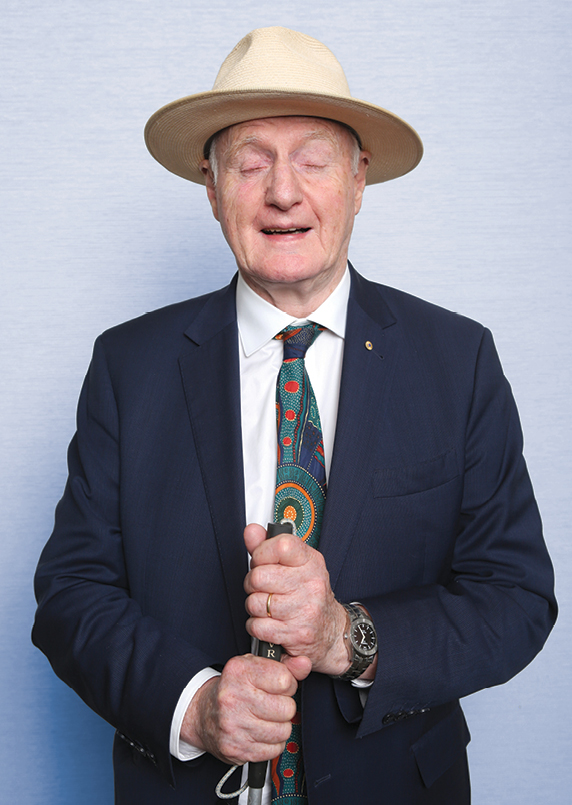
“I think I have always been a little uneasy with my identity. I grew up in a segregated school with brain damaged kids and there was a sheltered workshop near the playground where it was thought we’d end up. I wanted to survive. I tried to put my blindness in a cupboard and say I was going to survive despite it.
I was born blind with retrolental fibroplasia, so I had to think about what sort of career I could do. I loved history and English and my aim was to do an arts degree, but my marks were too high. My family decided I should give law a go and I found I was reasonably good at it. I have now taught law for 47 years and, apart from family, it’s the most important thing I’ve done.
In 1971, when I was finishing law, I never imagined the internet or computers. The only way I could access material was by having it read to me, which I would record to re-listen. I relied on my memory and worked often 14 hours a day. I would have loved to be a barrister, but I realised I would get swamped with documents at the last minute.
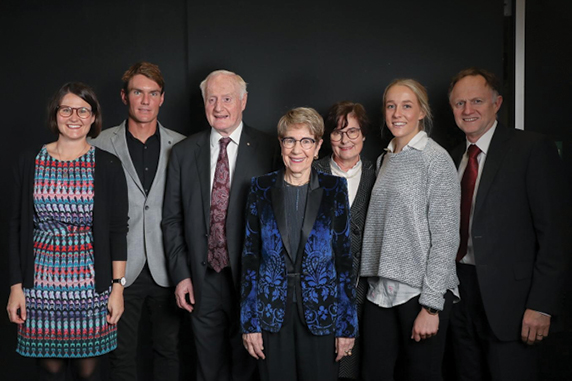
This is all ancient history, of course. Now I have an app on my iPhone that allows me to scan and read documents using synthetic speech. If you think that computers have altered your life, they’ve turned my life upside down.
My computers talk to me. I have books on my iPhone. I have an app that tells me the currency of bank notes. I have an app that tells me colour so I can do the family wash and know whether something’s light or dark. I can now tell my wife, ‘Now that was a nice blouse’. I married an academic and she would not have been happy being my research assistant nor would she have been happy staying home.
This is a whole different ball game and I think the sky is the limit for blind and visually-impaired people.
I couldn’t have been a dad or Dean of a law school without these technologies. It has liberated me and given me independence. I think for people with disabilities, we have to make our own way. The world can say we should have an even playing field, that we shouldn’t be discriminated against, but the world doesn’t owe us a living. It doesn’t say, because I’m disabled, I have to get employment as a lawyer.
In July of this year I published my memoir and called it Born at the Right Time, because I truly think I was. I knew men who’d been blinded in World War I and World War II who came back to nothing. I was part of a cohort of premature births who lost our sight, and by the 1960s we were pushing into university with these huge changes in technology.
I wasn’t sure I was ever going to have a partner or children. Without playing the violins, I wake up early and Mary is next to me sleeping and breathing, and I think to myself, ‘How did I end up this lucky?’
When I worked for the UN, I gained a broader understanding of disability and how most of us are in poverty. I have been fortunate to grow up in a developed country with access to technology that has changed my life.
In my spare time I like reading crime novels, being with my dog, meditating and listening to classical music. I have a son who’s a film composer. He won an Emmy and said, ‘Dad, what had you done by the age of 27?’
My family is very integral to my life. Mary and I have been together for 35 years. We work together, we share a study – it’s much easier to share a bed, let me tell you! I’m still just so in love. I wasn’t sure I was ever going to have a partner or children. Without playing the violins, I wake up early and Mary is next to me sleeping and breathing, and I think to myself, ‘How did I end up this lucky?’”
Annabelle Williams
Annabelle Williams has a congenital limb deficiency, but that hasn’t stopped her from becoming a Paralympic gold medallist, lawyer, director, sports commentator, diversity advocate, international keynote speaker and mum to 16-month-old Josie. In her early twenties, Williams broke numerous world records for swimming, taking home gold in the 2012 London Paralympics at just 24 years old. She achieved all this while completing a law degree at Bond University. Since retiring from swimming, Williams has worked at top-tier law firm Allens Linklaters, as Legal Counsel for the Australian Olympic Committee, and obtained an executive MBA while on maternity leave.
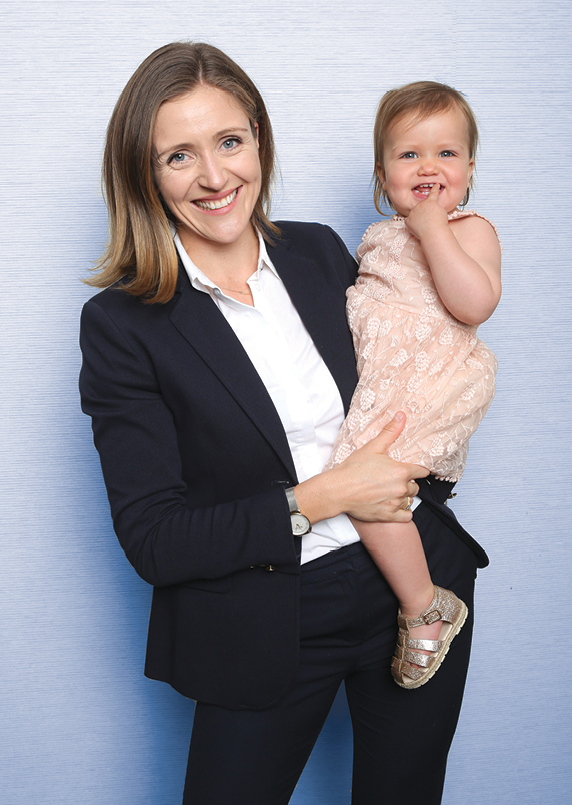
“You’re never going to have a high quite like winning a gold medal. And when you’re in a law firm slogging it out at 3am, no one’s giving you high fives.
When I was young, I wanted to be a diplomat. I remember going on the Department of Foreign Affairs [DFAT] website and seeing that everyone there had studied law. That’s what I decided I wanted to do. I was also inspired by my great uncle who was a judge. He was larger than life and used to tell these incredible stories about the law (that I now realise were completely embellished). Eventually I realised I didn’t want to be a diplomat, but I really enjoyed studying law.
I was offered a full scholarship to Bond University and trained less than five minutes away from campus. The reason I was able to balance swimming and law was because swimming was so early in the morning and in the evening.
Winning a gold medal was the best. It was so unexpected to win, as we were ranked fifth going into the 4 x 100m medley relay. Our race was incredibly close, the difference was less than half a second between the first four placegetters.
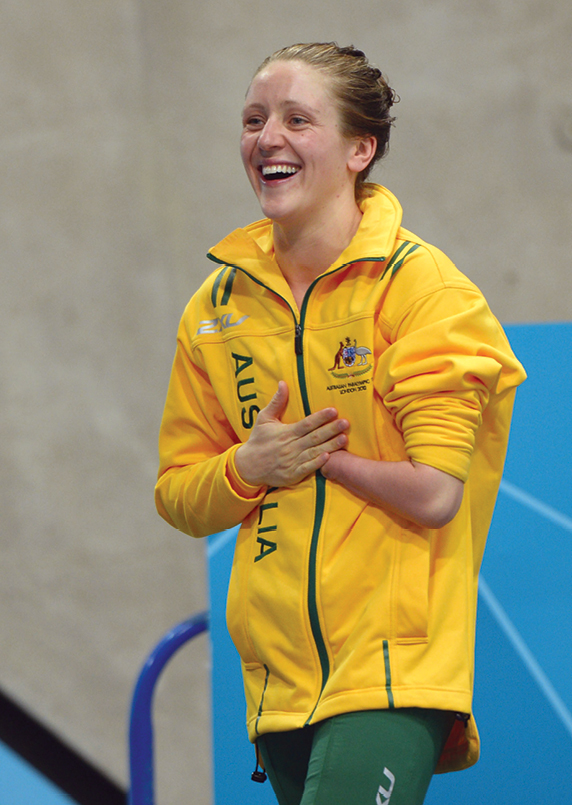
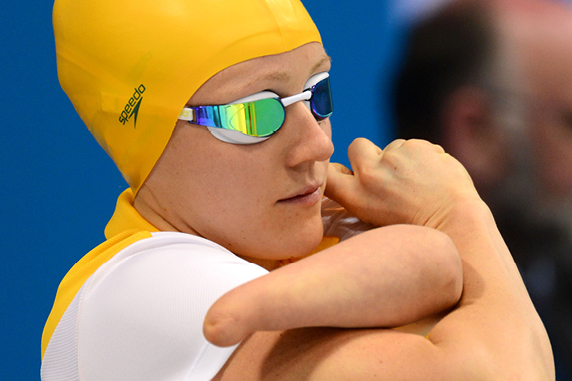
I retired from swimming after that race. I felt it was good to end on a high, and realised it was going to be much harder to combine swimming and work. I had a great opportunity to work at Allens and it seemed like the next logical step. While it was hard to make that transition, I felt lucky to have something to go to.
I was at Allens until 2015 and then went to the Australian Olympic Committee (AOC). While I was on maternity leave, I completed an executive program at Stanford University’s Graduate School of Business and was honoured to deliver the valedictory address. A number of opportunities came up while over there, so I thought it was a good time to leave the AOC and have a bit more flexibility with work and family. I’ve recently travelled to Europe and the USA to deliver keynotes.
I’m also privileged to be working in the disability space – as Vice President of the Board of Paralympics Australia and the Chair of the Athletes’ Commission.
I think people with a disability are vastly underrepresented in the workforce and we’re still so awkward with talking about it. There’s a way of having the conversation that makes the person with the disability not feel like they’re a burden.
What people don’t appreciate is the amount they’re missing out on by not having a more diverse workplace. In my experience, people with a disability are so capable and add so much value.
I think what people don’t appreciate is the amount they’re missing out on by not having a more diverse workplace. In my experience, people with a disability are so capable and add so much value. I remember walking into a dining hall in Beijing and I sat down next to a man with no arms. He was sitting with a laptop and a bowl of ramen and chopsticks and I thought, is someone coming to help? Then with one foot he lifted up the laptop and could touch type and the other foot he ate ramen with chopsticks.
In every workplace it’s all about perseverance, challenges, overcoming failure, problem solving – all things people with a disability have in spades. Having one arm, I often have to find a different way of doing things, so I am good at problem solving which translates to work.
I feel fortunate that my disability hasn’t affected my career, but of course there have been funny looks and comments. Sometimes as a lawyer you can use that to your advantage. I remember there were some people who couldn’t look away from my arm. I felt like I could say whatever I wanted, and they’d agree to it. I like seeing the humour in it.”


